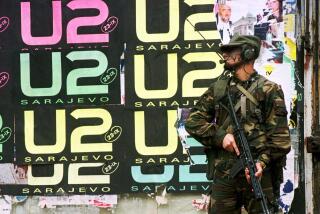U.S. Ambassador Travels to Suburbs in Rare Overture to Sarajevo Serbs
- Share via
SARAJEVO, Bosnia-Herzegovina — Many things are changing these days in what can now officially be called postwar Bosnia. And among them is the role of the U.S. ambassador.
In an effort to avert a threatened exodus by Bosnian Serbs from the Sarajevo area, U.S. Ambassador to Bosnia John Menzies traveled to Serb-held territory this week and met with the mayors of two Serbian suburbs of Sarajevo.
The rare public overture was the first contact that Washington’s ambassador to Sarajevo has had with rebel Serbian leaders on their turf in years--even though the journey was but a couple of miles.
In anticipation of the U.S.-brokered peace treaty that last week formally ended nearly four years of war in Bosnia, Menzies received instructions from his bosses to begin treating the Bosnian Serbs as part of a united Bosnia-Herzegovina, not as members of a separate republic. In other words, he was to begin acting as their ambassador too. Whether they wanted it or not.
The trip into the Serbian suburbs was the first time that this new policy was put into practice. Visits to other Bosnian Serb cities are being planned.
No American ambassador had traveled to the Serbian suburbs since before the war started in the spring of 1992, State Department officials in Washington said.
The nine districts around the Bosnian capital that are controlled by Serbian separatists have emerged as the hottest flash point in a country that otherwise seems to be slowly pacifying. About 20,000 American troops are gradually deploying to join 40,000 British, French and other NATO-led forces.
The Sarajevo Serbs have been vigorously protesting provisions in the peace accord that return their areas to government rule. The treaty aims to reunify Sarajevo, but the Serbs say they do not want to be governed by their enemy.
*
Some residents of Ilidza, Grbavica and other Serbian suburbs have begun leaving, and many others are threatening to do so. On Friday, a small number were seen digging up graves in order to take their loved ones’ remains with them. Serbs hold graves as sacred and fear desecration by the Muslim-led government.
The outcry from the Serbs represents the most potentially explosive challenge to the treaty that ended a war that has killed about 250,000 people since 1992. Diplomats and opposition politicians say the Bosnian government has not done enough to reassure Serbs that they are welcome to stay and their rights will be respected.
Under U.S. and other pressure, the Bosnian presidency issued a statement Friday inviting the citizens of Ilidza and the other Serbian districts to “accept the peaceful solution and stay in their homes,” adding that the government was committed to providing “full human and civil rights, as well as security for all citizens of Sarajevo.”
War criminals, however, will be punished, the presidency reiterated in the statement, which also declared a formal end to a 42-month “state of war.”
Mirko Pejanovic, one of two Serbs in the seven-member Bosnian presidency and author of Friday’s statement, said it went further than earlier declarations because the government this time refrained from distinguishing between civilians and soldiers. Previously, the government had suggested anyone who took up arms--practically every able-bodied male--would have to leave Sarajevo.
Whether the new statement or Menzies’ visit will change minds remained a big question, and the gradual exodus suggested otherwise. The captive audience of the Bosnian Serb propaganda machine for the last four years, many residents of the Serbian suburbs of Sarajevo are sure that they will become victims of reprisals, revenge and Islamic repression.
*
The contact between Menzies and the Serbs reverses a long-standing, if not always well enforced, policy against formal meetings with rebel Serb leaders on their home territory. U.S. officials, including Assistant Secretary of State Richard Holbrooke, who brokered the peace deal last month in Dayton, Ohio, have on occasion met with Bosnian Serb leaders during periods of negotiation--but not the ambassador to Bosnia.
American diplomats are also interested in identifying and promoting democracy-minded Serbs as possible candidates in elections that must be held within nine months under the peace accord. They seek an alternative to the hard-line nationalists represented by Bosnian Serb leader Radovan Karadzic, an indicted war criminal for atrocities committed by the Bosnian Serb army.
Pejanovic and other Serbs who remained in government-held Sarajevo have also initiated contact with Serbian intellectuals, artists and others in hopes of establishing dialogue. But many of the Serbs of the Serb-controlled portions of Sarajevo regard their ethnic brethren who stayed with the Bosnian government as the most contemptible of traitors.
The complexities of dealing with divided Sarajevo may have come a bit more into focus this week. The North Atlantic Treaty Organization force charged with enforcing the peace treaty decided to place a headquarters in Ilidza and proceeded to strike a lucrative rental deal with Serbian officials there.
Sarajevo Mayor Tarik Kupusovic wrote NATO to argue that if Ilidza is to revert to government control, then NATO ought to enter into the leasing agreement with the Bosnian government, not the Bosnian Serbs.
Times staff writer Stanley Meisler in Washington contributed to this report.
More to Read
Sign up for Essential California
The most important California stories and recommendations in your inbox every morning.
You may occasionally receive promotional content from the Los Angeles Times.














